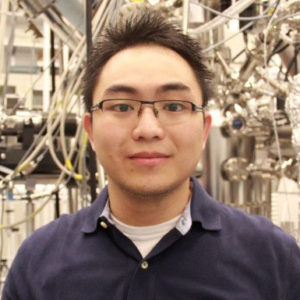Clark Chen and Ryan Edwards have been named the recipients of the Maeder Graduate Fellowship in Energy and the Environment for the academic year 2016-2017. Chen and Edwards are graduate students in the departments of chemical and biological engineering and civil and environmental engineering, respectively. The abstracts below summarize the research they will conduct during the year. Selection for the Maeder Fellowship is based on the potential of the research and researcher to help develop technical solutions to ensure our sustainable energy and environmental future.
Clark Chen
 Rational Design of Transition Metal Oxyhydroxide Catalysts for Oxygen Evolution Reaction
Rational Design of Transition Metal Oxyhydroxide Catalysts for Oxygen Evolution Reaction
Fuel production using solar energy has great potential to provide sustainable and low carbon energy supplies, and addresses a key challenge facing society. Hydrogen production and carbon dioxide reduction can both be achieved by harnessing solar energy. A key component in these processes is the oxygen evolution reaction that must take place simultaneously, and this reaction often decreases the overall efficiency. Oxygen evolution is a complex reaction that requires four electron transfer steps, involves multiple intermediates, and requires significant energy input to improve the sluggish reaction kinetics. Advances in both fundamental understanding and fabrication of practical electrodes are needed to improve the efficiencies in solar hydrogen production and carbon dioxide reduction.
For the year of the fellowship, my research will focus on exploring active, stable and affordable catalysts based on transition metals through rational materials design. Specifically, a focus will be on the synthesis of binary and ternary oxyhydroxide catalysts such as NiMn, CoNi, and CoFeNi oxyhydroxides. Emphasis will be placed on investigating the correlation between catalyst structure, chemical composition, and the activity towards oxygen evolution reaction. This will allow developing design principles for active transition metal based catalysts. Furthermore, catalyst stability, which is a critical concern for commercial application, will be investigated in prototype zinc-air batteries and water splitting cells. The outcome of this research will provide new insights for future catalyst development using Earth abundant resources.
Ryan Edwards
 Investigating the Fate of Hydraulic Fracturing Fluid in Shale Gas Formations
Investigating the Fate of Hydraulic Fracturing Fluid in Shale Gas Formations
The shale gas production boom in the United States has led to abundant and cheap natural gas supply, but it has also raised concerns about potential environmental impacts from the extraction processes. High-volume hydraulic fracturing – a key process for shale production – has attracted particular scrutiny. Hydraulic fracturing in shale gas formations involves the injection of large quantities of water-based fluid (typically around 20,000 m3 per well) into the shales in order to fracture the rock. Most of the injected fracturing fluid (typically around 70%) does not return from the well when production begins. The large proportion of fluid that does not return raises questions about the fate of that fluid: could it potentially migrate toward drinking-water aquifers and the surface? Could it block flow paths and impede gas production?
This research aims to investigate the hypothesis that the remaining fracturing fluid is spontaneously imbibed into the shale rock and retained there due to high capillary pressure in the shale. The investigation involves numerical modeling of the two-phase flow of hydraulic fracturing fluid and gas in the shale during the fluid injection and subsequent gas production. The modeling will assess whether sufficient quantity of fluid could imbibe into the shale within the timescale of injection, as well as the distribution of fluid within the fracture-shale system and its evolution over time. Particular attention will be focused on determining the dominant physical process(es) governing the fluid movement, the role of rock structure heterogeneity, and the implications for the long-term fate of the fluid.